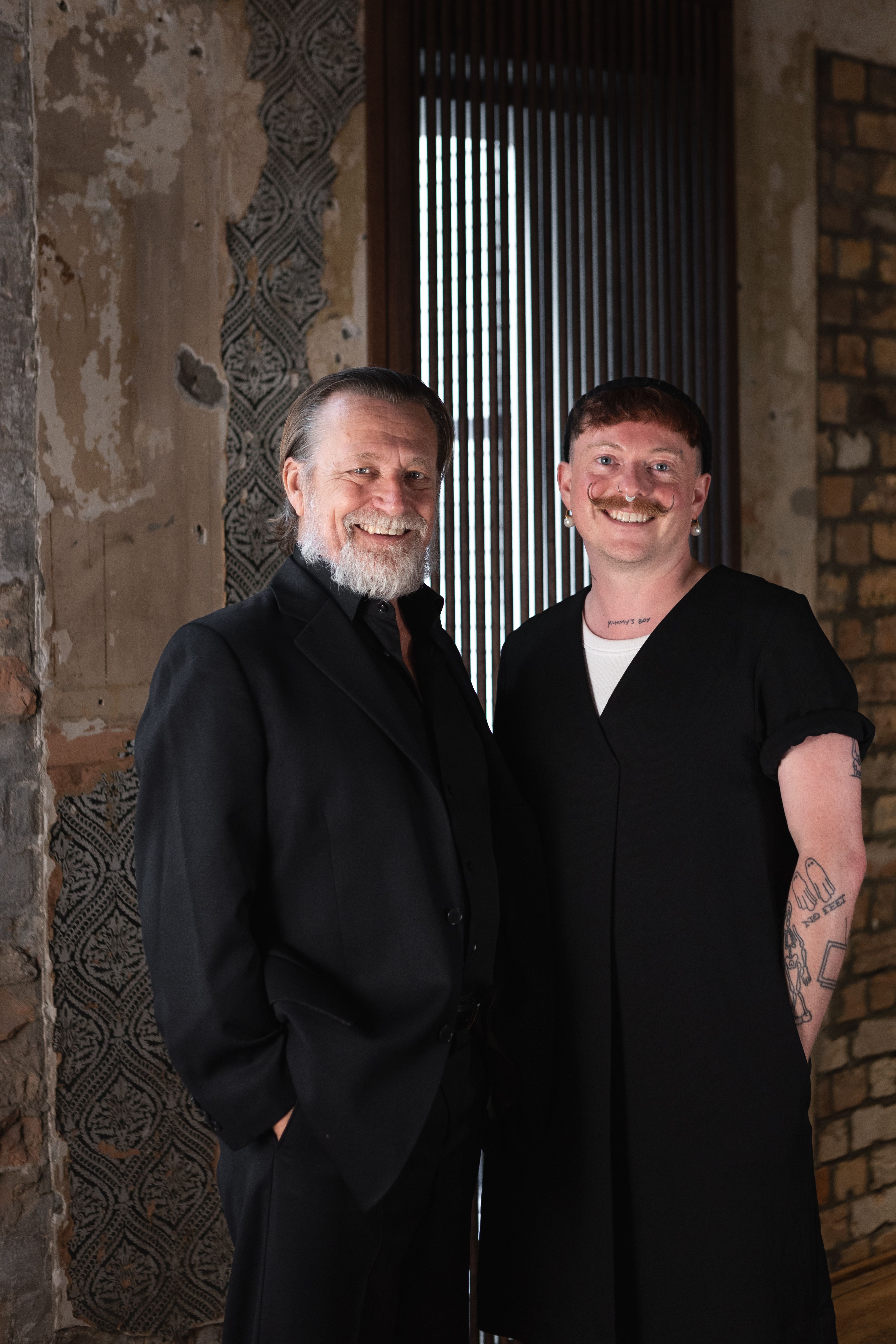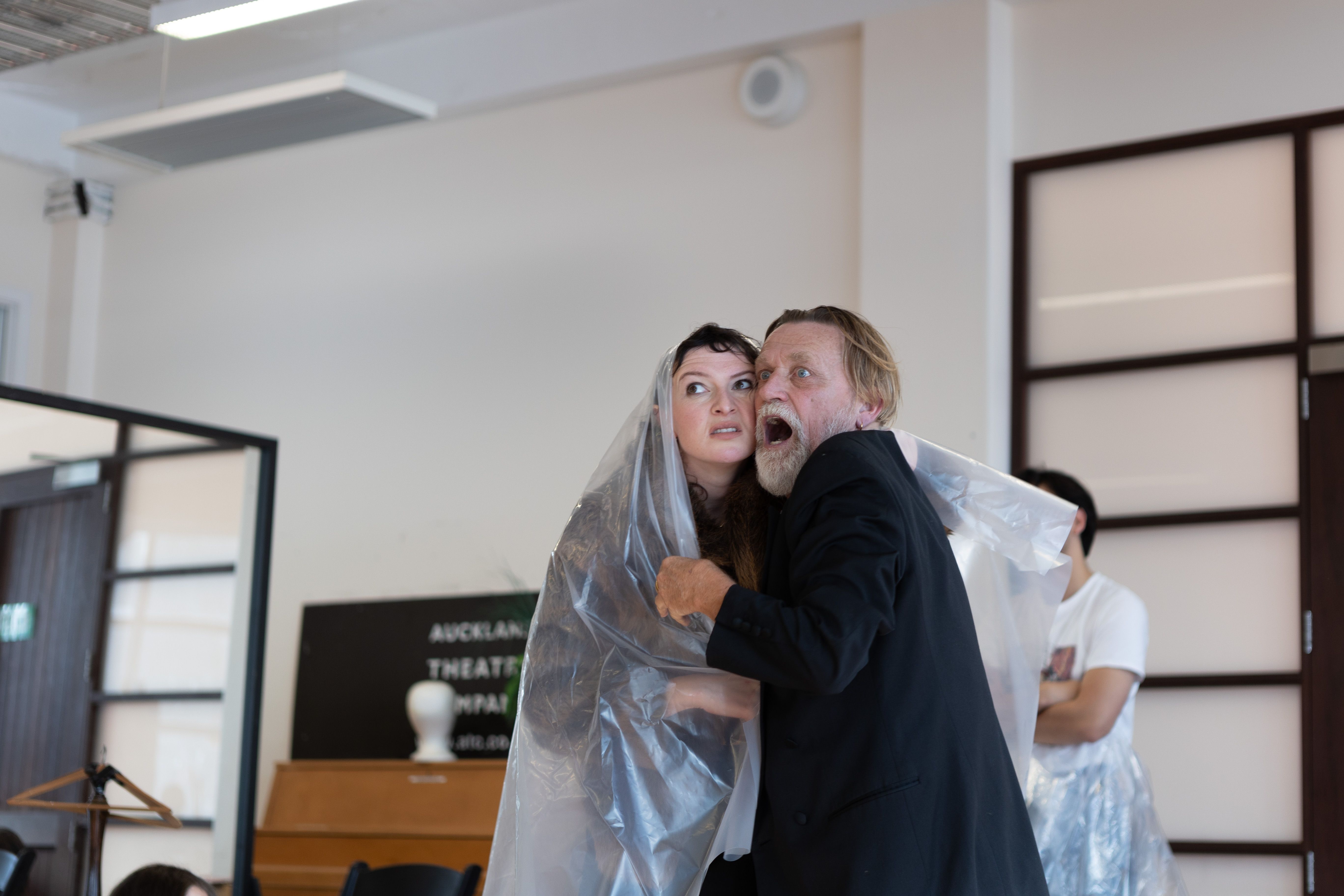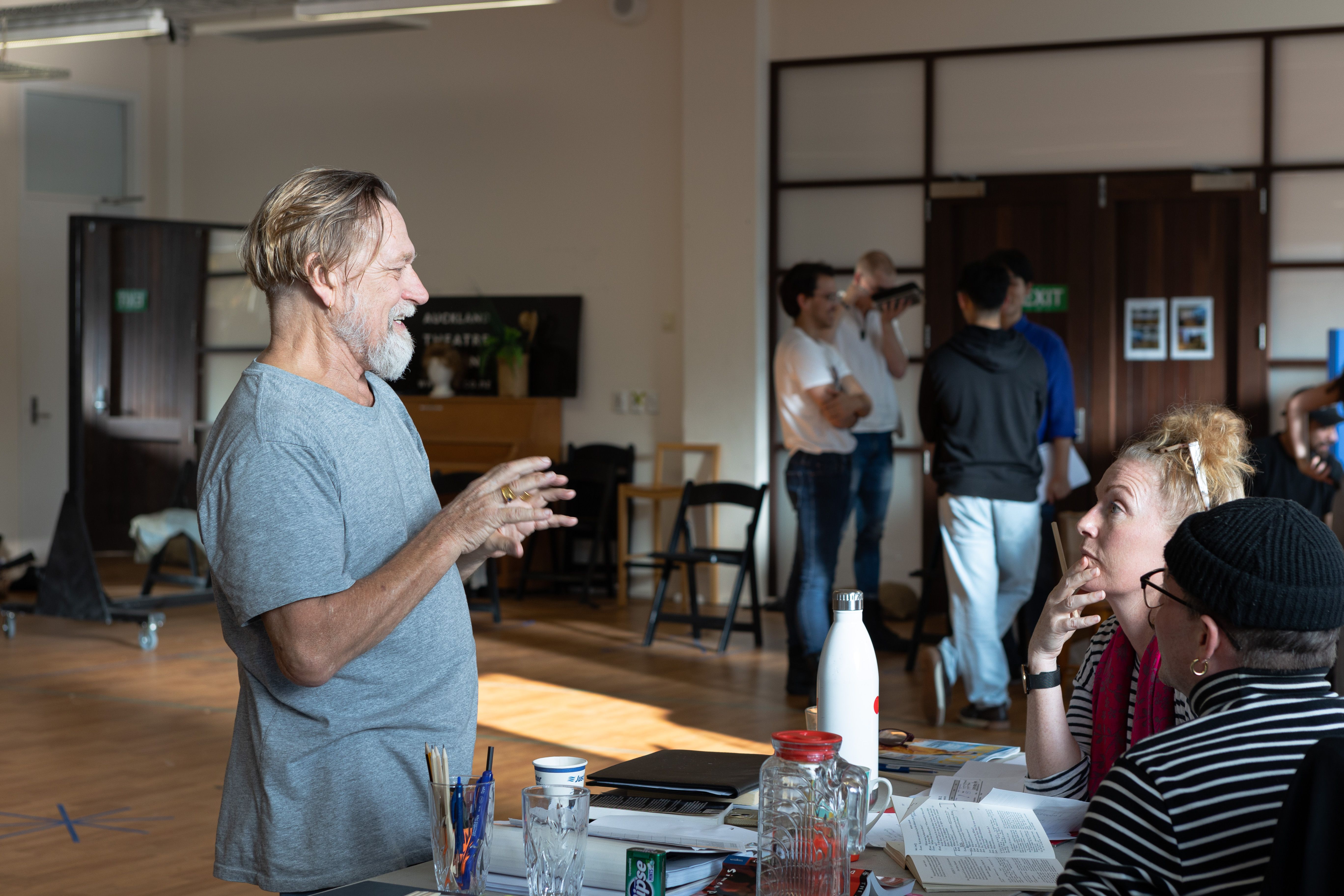“Be Not Afraid Of Greatness…”
Wondering how a 400-years-dead Englishman is relevant in Aotearoa today? Adam Fresco chats with co-directors Michael Hurst and Benjamin Henson ahead of Auckland Theatre Company’s production of Shakespeare’s King Lear.
Written by

Yes, this is a story about William Shakespeare.
This isn’t one of those think pieces arguing Shakespeare is outdated, or even a defence of the Bard of Avon as the be-all and end-all, go-to, must-do of theatre. Rather it’s an acknowledgement that, when it comes to Elizabethan English, Shakespeare was simply a great writer, poet, and dramatist.
That shouldn’t scare you, nor fill your heart with fear.
Ask yourself: does admiring the work of artist Frida Kahlo stop a painter from working in Christchurch today? Does digging The Beatles prevent musicians in Balclutha from forming a band? Does the work of US horror author Stephen King prevent a kid in Kaikōura from writing short stories? Do the sketched inventions of Italian genius Leonardo da Vinci mean a teen in Lower Hutt can’t dream of designing a more efficient engine? Or should the musings of Ancient Greek philosopher, Plato, put off a thinker in New Plymouth writing her thesis today?
The answer to all the above is a resounding “no” (or perhaps an archaic, Shakespearian “nay”). That was clear from the moment I sat down to chat with Aotearoa actor, director, and theatre stalwart Michael Hurst in a café on Auckland’s Karangahape Road. My question: Is Shakespeare relevant here, in Aotearoa, today?
Hurst’s answer? An unhesitating “Yes, because his works are transcendent”.
Hurst's King Lear co-director, Benjamin Henson, agrees: “Shakespeare is not about reverence. His works are not plays we read or perform once, but again and again. Their meaning changes. Who you are, who the actor is, and who the audience are changes - as does the meaning of the plays.”
Hurst is not just co-directing with Henson, but also taking on the role of the mad King in Auckland Theatre Company’s (ATC) upcoming production of the play - ATC’s first Shakespearian undertaking in over a decade (13 June - 9 July).
But why should it matter? Who cares? Can some long-dead white bloke, born some 450 years ago in Stratford, England in 1564, have anything of relevance to say today? In Aotearoa? In the 2020s?
Mozart’s long dead. How can they still be relevant? How could Pythagoras, or Picasso, Socrates or Sylvia Plath, Maya Angelou, Aristotle, Alice Walker, Katherine Mansfield, Toni Morrison, Virginia Woolfe, David Bowie, Nelson Mandela, Karl, or Groucho Marx, or indeed any pile of decomposed bones have anything to say about today?
Whilst dismissing someone as relevant just because they have the unfortunate disadvantage of being deceased may be a little extreme, there is still the point to be made that the British Empire invaded Aotearoa, sublimated the people already there, and established a colony based on a language, education, religion, monarchy, and culture, some eighteen-and-a-half thousand kilometres away.
When it comes to colonialism, as the African proverb has it: “Until the lion learns to write, every story will be about the hunter.” Which makes Shakespeare’s version of things the hunter’s point of view.
Seen in that light, how can artists justify celebrating Shakespeare in modern Aotearoa? Aren’t we just carrying the colonial torch, passing on the assumption that Bill Shakespeare offers the best in poetry and plays to another generation? A generation who would surely be better served by local writers every bit as deserving of attention and public funding as the long-decomposed Bard of Avon?

Again, the answer from Hurst and Henson (above) is a resounding “no”.
As Hurst says: “Shakespeare offers characters with real, complex psychologies. These are richly observed people.” He continues, “Shakespeare’s plays absorb things and present them back in new ways”.
The plays hold a mirror up to the audience and the times, and to make any play reflect contemporary audiences is the responsibility of the artist. Theatre remains contemporary because today’s performers, creators, and audiences bring with them their experiences of today’s society.
We can’t help but make art relevant to our own time, place, and situation.
Hurst is quick to point out that this concept - of live theatre reflecting the times - is itself Shakespearian. It’s what Prince Hamlet advises the players, before they perform ‘The Mousetrap’ for the royal court of Denmark. Hamlet beseeches the actors “to hold, as 'twere, the mirror up to nature, to show virtue her own feature, scorn her own image, and the very age and body of the time his form and pressure” (Hamlet, Act III, scene ii).
Of course, you can do that with any writers’ work. But Hurst means more than dressing up a tale in modern clothing, or playing contemporary pop songs over scenes. Take for example the recent visit to Aotearoa by Sydney Theatre Company, to perform an adaptation of Oscar Wilde’s 1890 tale, The Picture of Dorian Gray.
A spectacular, multimedia performance by one actor playing twenty-six roles, (supported by a nimble ensemble of fourteen highly choreographed crew, juggling a range of cameras, recording devices, lights, props and costumes). Director Kip Williams’ adapted Wilde’s tale into a mirror of a society obsessed with surface appearance. From taking selfies live on stage, to photoshopping images in front of us, Dorian’s self-obsession reflects how social media has taken some to a whole new nadir of narcissism. As the protagonist, actor Eryn Jean Norvill plays a character who, even in 1890, was a subversive, wildly satiric take on heterosexual norms, making a text from 1890 feel relevant, immediate to our world today.
Questions of gender are not far from Hurst’s mind either. He’s quick to ask: “Where is Mrs Lear?” This refusal to ignore the mad King’s missing wife is another indication that this new production of Shakespeare’s Lear is not stuck in the past.

During Shakespeare’s day, only men were allowed to act, but that is no reflection on modernity. Hurst and Henson are not looking at an all-male, all-Caucasian cast. Just as Lin Manuel Miranda’s Hamilton reflects the makeup of current-day USA, casting actors of myriad gender, race, and colour, so modern Shakespearian productions seek cast members that reflect their audience. As Hurst says:
Interpretation is key. Theatre remains modern because we are modern.
Then of course, there’s the central story of Lear, which Hurst describes as “The disintegration of a royal family in public.” What could be more contemporary in this coronation year? It seems a direct reflection of the state of a certain, far, far away monarchy. A tale told by the coloniser, reflected back by the colonists. It’s all, as Hurst said, a matter of interpretation. Indeed, as that Irish wit Oscar Wilde noted in his preface to Dorian Gray: “It is the spectator, and not life, that art really mirrors”.
What decides whether Shakespeare is relevant to any age is our contemporary interpretation of the texts. Was the original Merchant of Venice antisemitic? Certainly, Shakespeare wrote in less enlightened times. However, as Hurst points out, Shakespeare’s characterisation of the money-lender Shylock is no simple, two-dimensional sketch, but that of a complex, all-too human character. Prick him and he bleeds, faults and all. The play may have been penned in antisemitic times, but lends itself to new interpretation. That does not necessarily mean dressing the play up in modern costumes, or having Shylock appear as if a concentration camp inmate, and the Venetian court in Nazi uniform.
Interpretation is in the telling of the tale - the actors’ choices, the production’s artistic intent. Is Othello inherently racist? Is Henry V a paean of war? Are Shakespeare’s works a celebration of colonialism? The answer is that they are written with such complexity and depth, touching on so many universal themes, and key human concerns, that they can be anything we wish them to be.
It's, for this reason, Hurst finds Shakespeare’s plays to be “not exclusive, but inclusive.” He and Henson both agree that if there’s someone who writes better, bigger, more impactful, and meaningful plays than Shakespeare, then they would love to stage them.
The issue is not that Shakespeare is irrelevant, distant, alien, or outdated - but that his works really are that good. As Shakespeare noted in Twelfth Night: “Be not afraid of greatness: some are born great, some achieve greatness and some have greatness thrust upon them’’ (Act II, scene v).
“Yes,” Hurst agrees, “Shakespeare is difficult. The language is hard. So? Do it properly.” Research it. Learn it. Live it. Play it. There are plenty of great artists we need to meet halfway, by doing the work. From the novels of Irish author James Joyce, to the music of German composer Karlheinz Stockhausen; the films of Russian director Andrei Tarkovsky, the performance art of Serbian conceptual artist, Marina Abramović, or the sculptures of French artist Louise Bourgeois.

That any artist achieves greatness, popularity, fame, or success in their field - be they Banksy or Beyonce - should not, and does not, stop new and emerging artists, whether they're from Paris or Palmerston North, New York or Nelson. Great art is not to be feared, but embraced, learned from, and used as inspiration to create new and local works.
Just because there was a Mozart does not stop you creating music. Rather, the very existence of a Mozart, Beethoven, Philip Glass, The Sex Pistols, Radiohead, Neil Finn, Six60, Stan Walker, or Lorde throws down the gauntlet and challenges you to stand on the shoulders of giants and enter the fray.
The same in movies. Quentin Tarantino stands on his heroes’ shoulders, be they Brian DePalma or Sergio Leone, just as Scorsese is influenced by Hitchcock and Kubrick, or they by those who came before, from Sergei Eisenstein to Charlie Chaplin.
Shakespeare is revered in theatre and poetry because the author took stories, histories, fictions, and fact, myth and legend, and melded them into something unique. Whoever Shakespeare was, and there are theories aplenty, he, she, them, they, or it, left us with a series of works that remain for many as yet unparalleled.
That is not to say Bertolt Brecht, Tom Stoppard, David Mamet, Caryl Churchill, Harold Pinter, Arthur Miller, Briar Grace-Smith, Toa Fraser, Whiti Hereaka, or Lin Manuel Miranda haven’t penned great plays. The works of Shakespeare need not impede new works. Instead, they should challenge authors to say, in the words of that popular meme: “Hold my beer”.
If in writing these words I stopped to ponder the great essayists, writers, and journalists - be they Mark Twain, or James Baxter, Steve Braunias, Janet Frame, or Eleanor Catton, or Witi Ihimaera - I would stop mid-sentence in surrender.
It’s too hard. They’re too good. It’s all been done before, and better. It always will be.
The only way to improve is to embrace what has gone before. To study it. To read it. To, as Hurst said, to accept it might be hard, and do the work. To revel in the use of words and, in so doing, get inspired, not put off.
Building on the greats of the past means accepting we are not who we admire. We can’t all be Kurt Vonnegut, or Charles Dickens, Toa Fraser, or Hinemoana Baker - find your own voice.
Take, for example, the work of British actress and playwright, Abigail Thorn, perhaps best known for her You Tube channel, Philosophy Tube. Thorn publicly came out as a transgender woman in January 2021, and the very next year wrote and performed in her play, The Prince, a transgender-themed retelling of Shakespeare’s play Henry IV, Part I, (with a bit of Hamlet thrown in for good measure).
The play’s eight-person ensemble featured trans actors, in a narrative in which Thorn’s character of Hotspur becomes self-aware. Playing with Shakespeare’s Hotspur as a character often regarded as a portrait of idealised manhood, Thorn set out to subvert traditional gender norms.
In a September 2022 interview for LGBTQ+ website, The Pink News, Thorn discussed her attraction to Shakespeare’s works:
“There’s so much transgender potential in Shakespeare, especially because in Shakespeare’s time, all the roles would have been played by men. Shakespeare is full of jokes about people dressing up as the other gender and people being confused for the wrong person and double layers and meaning. The famous quote in Hamlet – ‘O that this too solid flesh would melt’ – is such a trans mood.”
Shakespeare can and is used to reflect the times and circumstances, culture and politics of the society in which it is performed. Genders can be swapped, races inverted, transgression and transition explored, language translated, identity and performance questioned - but in the end what makes Shakespeare relevant is how artists choose to interpret the works.
When Shakespeare’s work was first published in 1623, seven years after his death, playwright Ben Jonson wrote that Shakespeare was “not of an age, but for all time.” From words and phrases Shakespeare created (such as “tongue-tied,” “green-eyed jealousy,” or “It’s all Greek to me”), to his works being translated into over one hundred languages, performed regularly throughout the World, and constantly reimagined, restaged, and reworked on stage and screen, Shakespeare has proved one of history’s most resilient, adapted, and adaptable, writers. But that’s not to say new work by new artists should be ignored. Quite the opposite.
In other words? Don’t fear greatness. Rather see it as a challenge to meet.
As Hurst explains: “It is our responsibility to make Shakespeare’s works reflect our audiences, and our times.”
So, if you are a would-be writer, whether for stage, screen, podcast, radio, comic book, graphic novel, short story, poetry or whatever medium you choose, remember - the best way to lay claim to being an author is to write, because, as Shakespeare’s King Lear says so aptly put it: “Nothing can come of nothing.”